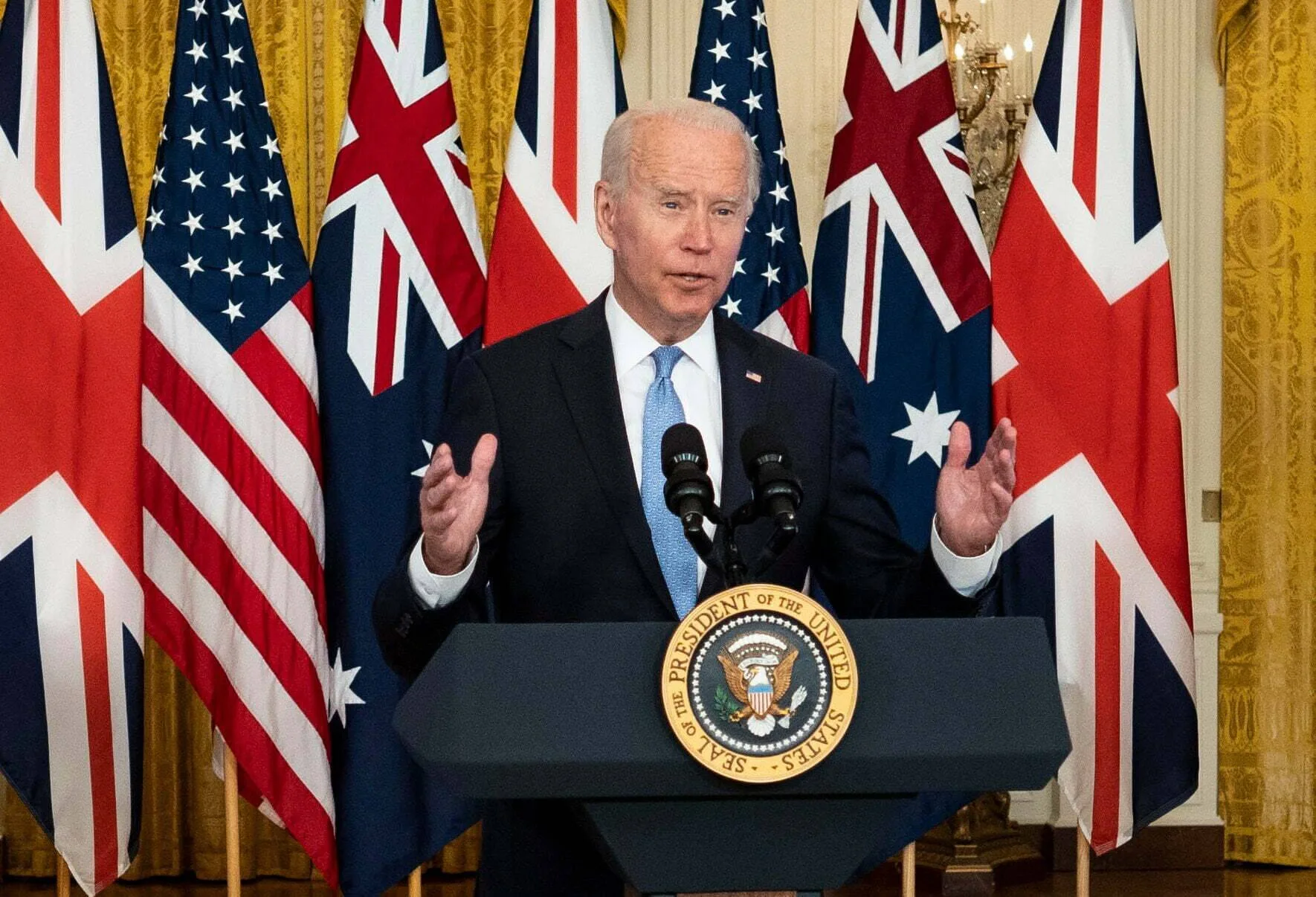The new allies agreement will include cooperation on nuclear-powered submarines, artificial intelligence and state-of-the-art defence technology.
President Joe Biden recently announced a new working group with the UK and Australia to share advanced technology – including the acquisition of nuclear powered submarines – in a thinly veiled attempt to counter China
The trio, now known by the acronym AUKUS, will make it easier for the three countries to share their information and know-how in key technological areas such as artificial intelligence, cyber, quantum, underwater systems and long-range strike capabilities.
Biden, virtually joined by British Prime Minister Boris Johnson and Australian Prime Minister Scott Morrison on Wednesday afternoon, detailed the reasons for the tripartite effort.
“It’s about investing in our greatest source of strength, our alliances and updating them to better deal with the threats of today and tomorrow,” Biden said from the White House between two monitors. showing other world leaders. “AUKUS – sounds strange, all those acronyms, but it’s a good one.”
“We now need to take our partnership to a new level,” said Morrison.
“We’re adding a new chapter in our friendship,” added Johnson.
The three countries will work over the next 18 months to find the best way to deliver the technology, which the United States has traditionally only shared with the United Kingdom, the official said. U.S. officials and experts have noted that Australia currently does not have the fissile material necessary to operate a nuclear-powered submarine, meaning the next year and a half of negotiations will likely include discussions on the transfer of nuclear materials.
Washington and Canberra signed a gold standard “123 agreement” in 2010 in which Australia vowed not to enrich or reprocess nuclear material sent by the United States.
Australia is not looking for a nuclear weapon, stressed Morrison and Biden. However, a senior official in the US administration previewed the remarks Wednesday morning about nuclear-powered submarines that “this technology is extremely sensitive. It is frankly an exception to our policy in many ways. I do not anticipate that this will be undertaken under other circumstances in the future. “
There is nothing explicitly about China in the tripartite deal, but two US officials noted the subtext of the announcement was that it was another move by Western allies to fend off China’s rise in the military and technology arena.
“This is a surprising and extremely welcome sign of the Biden administration’s willingness to strengthen close allies like Australia by providing state-of-the-art defense engineering assistance – something Washington has seldom been ready to do,” said Ashley Townshend, director of foreign policy and defense programming United States Center in Sydney. “It proposes a new and more strategic approach to working with allies on the defense priorities of the Indo-Pacific.”
Canberra will abandon a $ 90 billion submarine deal with France and instead acquire American nuclear submarines with the help of Britain, and the Australian government has been grappling with design changes and cost increases in recent years.
Neither Naval Group nor the French government has made a comment on the change in direction.
The new class of nuclear submarines will give Washington and its allies in the Pacific a powerful new tool to contain China’s military expansion and will be a continuation of the current deployment of the British aircraft carrier in the region and recent French transits. and German warships in the South China Sea.
The United States and the United Kingdom have long collaborated on their nuclear-powered submarine programs, sharing technology across different classes of ships. Bringing Australia into the sheepfold would be an important step in increasing the ability of the three countries to operate together underwater in the Pacific, as well as adding a powerful allied strike in a region that is currently lacking.
Another US official said it would take several years to sell any submarines to Australia. But in the meantime, there will be pressure for more US nuclear submarines to call at ports in Australia to show their presence. Late last year, the United States entered into an agreement with Norway to expand and modernize an Arctic port to allow U.S. nuclear-powered submarines to dock and replenish supplies, a major step for extended operations in the Far North, where the powerful Russian Northern Fleet is sustained. sway.
Pentagon officials have already begun working with Congress to try to pave the way for greater industrial cooperation with Australia and the UK, a process that may take some time as US-based defense companies and congressmen are likely to proceed cautiously with sharing technology and potentially relocating some jobs.
“We are working with Congress to make sure we have the authority to invest in Australia and the UK,” Jesse Salazar, the Pentagon’s deputy assistant secretary for industrial policy, said at an event at George Mason University on Wednesday.
Beijing has a growing arsenal of missiles at its disposal and its forces are increasingly aggressive, navigating warships near Japanese and American waters in recent days. It is part of China’s effort to assert its primacy in the Indo-Pacific and claim disputed territories. Chinese officials say the territory that falls within the country’s “nine-line line” in the South China Sea belongs to Beijing.
In response, the US continues to build partnerships with other nations that serve as a bulwark against China. One of these groups is known as “the Quad”, made up of the USA, Japan, Australia and India. Formed in its current iteration in 2017, the four-nation cluster is wary of explicitly saying its economic, technological and military cooperation is aimed at thwarting Beijing’s goals, but analysts say the Quad wouldn’t be as robust today if it weren’t for continued aggression from China.
On September 24, the four leaders of the four nations will gather at the White House for the first-ever in-person rally at the group leadership level.
Japan has long feared Chinese intentions and provocations in the East China Sea, but Australia and India have witnessed recent hot spots.
A trade war between China and Australia has worsened relations between the countries. The dispute, which began in April 2020 after Prime Minister Scott Morrison asked for an investigation into the origins of Covid-19, cost the two nations about $ 4 billion. Josh Frydenberg, an Australian treasurer, accused Beijing this month of trying to exert “political pressure” with sanctions on Australian products







